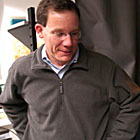Health
-

How realistic is ‘The Pitt’?
Doctors weigh in on what hit TV show gets right and wrong about life in the ER — from pacing and caseloads to workplace culture (and that waiting room from hell)
-

Yoga can help cut severe, initial opioid-withdrawal period in half, study finds
Researchers say results could dramatically increase chances of recovery
-

6 keys to a long, healthy life (ice cream included)
Also, why reading Ben Franklin beats climbing Mount Everest
-

Six cancers rising faster in younger adults than older ones
Large new global study fuels growing concern over trend of increases in several types

-

What’s next for GLP-1s?
Scientists eye new treatment targets for popular weight-loss drugs, from heart failure to addiction
-

Drinking 2-3 cups of coffee a day tied to lower dementia risk
Caffeinated tea also found to slow cognitive decline in study

-
1.8 million veterans lack health coverage
Of the 47 million uninsured Americans, one in every eight (12.2 percent) is a veteran or member of a veteran’s household, according to a study by physicians from Cambridge Health Alliance who are also Harvard Medical School researchers. The study is published in the December issue of the American Journal of Public Health. Approximately 1.8 million veterans (12.7 percent of nonelderly veterans) were uninsured in 2004, up 290,000 since 2000, the study found. An additional 3.8 million members of their households were also uninsured and ineligible for VA care.
-
Med students don’t study war, ethics
A new survey of U.S. medical students shows they receive little training about what they should or should not do in wartime, despite ethical questions over physician involvement in prisoner interrogation and a legal framework making a “doctor draft” possible.
-
DNA reveals Neanderthal redheads
Ancient DNA retrieved from the bones of two Neanderthals suggests that at least some of them had red hair and pale skin, scientists report this week in the journal Science. The international team says that Neanderthals’ pigmentation may even have been as varied as that of modern humans, and that at least 1 percent of Neanderthals were likely redheads.
-
Lava provides window on early Earth
Researchers at Harvard and the University of Hawaii believe they’ve resolved a long-standing controversy over the roots of islands — volcanoes in the middle of tectonic plates — showing that the islands’ lava provides a window into the early Earth’s makeup.
-
Researchers create colorful “Brainbow” images of the nervous system
By activating multiple fluorescent proteins in neurons, neuroscientists at Harvard University are imaging the brain and nervous system as never before, rendering their cells in a riotous spray of colors dubbed a “Brainbow.”
-
Almost two million veterans lack health coverage
One in every eight (12.2 percent) of the 47 million Americans without health insurance is a veteran or member of a veteran’s household, according to a study by Harvard Medical…
-
Economic motivation could underlie some ordering of imaging tests
A new study by researchers at Institute for Technology Assessment in Massachusetts General Hospital’s (MGH) Department of Radiology finds that physicians who consistently refer patients to themselves or members of…
-
Berkman named to head Center for Population and Development Studies
Social epidemiologist Lisa Berkman has been appointed director of the Harvard Center for Population and Development Studies, Harvard Provost Steven E. Hyman today announced. “I am extremely pleased that Professor…
-
Improving child survival around the globe is key goal of United Nations
Reducing child mortality rates for children under 5 — which in 2004 was 6.5 (per 1,000 children annually) in Latin America and the Caribbean, about 20 in South Asia, and 39 in sub-Saharan Africa — is one of the United Nations Millennium Development Goals (MDGs). These goals were established at the beginning of this decade to address the problems of global poverty, health, and sustainability. Targets were set related to these issues, to be achieved by 2015. However, there are concerns at the midway point that the targets will not be achieved.
-
Steven Pinker’s ‘Ideas on the Fringe’
Not long ago, Steven Pinker appeared on “The Colbert Report.” He managed to explain the functioning of the human brain to Stephen Colbert in only five words: “Brain cells fire in patterns.”
-
Panel investigates media reporting on science and politics of stem cells
Stem cells, politics, “fairness,” and what one participant termed “the disintegration of traditional journalism,” were all on the bill at Thursday night’s (Oct. 18) public forum titled “Stem Cells and the Media,” hosted by the Harvard Stem Cell Institute.
-
Improving women’s health key Indian strategy
Detailed research of Indian health disparities has revealed that significant differences in access to health care exist even within families, with the health and nutrition of women and girls taking a backseat to that of men and boys.
-
Field school brings students to Borneo
Morning came in the middle of the night in the hikers’ hut partway up the side of Borneo’s towering Mount Kinabalu.
-
It took a novel tack to discover an obesity gene
The racing sailboat was small, and Christoph Lange wanted to be sure he didn’t capsize and plunge into the Charles River again, as he’d done half a dozen times that…
-
Eating whole-grain cereals may help men lower heart failure risk
Men who consume a higher amount of whole grain breakfast cereals may have a reduced risk of heart failure, according to a report by Harvard researchers published in the October…
-
Massive microRNA scan uncovers leads to treating muscle degeneration
Researchers have discovered the first microRNAs–tiny bits of code that regulate gene activity–linked to each of 10 major degenerative muscular disorders, opening doors to new treatments and a better biological…
-
New York Mayor Michael Bloomberg to receive Richmond Award for promotion of public health in NYC and nation
New York City Mayor Michael Bloomberg has been named to receive the Harvard School of Health’s annual Julius B. Richmond Award for his extraordinary leadership in working to protect and…
-
Media can’t separate stem cell science from politics
Stem cells, politics, “fairness,” and what one participant termed “the disintegration of traditional journalism,” were all on the bill at Thursday night’s Public Forum titled “Stem Cells and the Media,”…
-
Popular causes not necessarily best
Conservation policies favoring keystone animal species are insufficient to conserve the world’s biodiversity because many of these target animals don’t live in the world’s most biodiverse spots: lowland tropical forests under pressure from agriculture, logging, and other human activities.
-
Nanowire makes own electricity
Harvard chemists have built a new wire out of photosensitive materials that is hundreds of times smaller than a human hair. The wire not only carries electricity to be used in vanishingly small circuits, but generates power as well.

-
Study probes academic, industry relationships
A study led by members of the Massachusetts General Hospital Institute for Health Policy (MGH-IHP) has found that institutional academic-industry relationships — financial relationships companies have with medical schools or teaching hospitals rather than with individual physicians or scientists — are as common and pervasive as individual relationships. The report, the first nationwide look at the extent and impact of these relationships, appears in the Oct. 17 issue of the Journal of the American Medical Association.
-
Reform, vigilance needed to boost women in science
The pipeline isn’t the problem. That was the message of speakers addressing the topic of low numbers of women in top academic positions in science and engineering Wednesday (Oct. 10).
-
Medical schools’ departments, department heads often have industry relationships
BOSTON – A study led by members of the Massachusetts General Hospital Institute for Health Policy (MGH-IHP) has found that institutional academic-industry relationships – financial relationships companies have with medical…
-
Database of human genetic diversity allows identification of disease-associated genes
Investigators from six countries have completed the second phase of the International HapMap Project, an effort to identify and catalog genetic similarities and differences among populations around the world. Information…
-
Income Inequality Associated with Double Disease Burden of Overnourishment and Undernourishment in India
It has been known that countries with rapidly developing economies may experience a double-disease burden that results from undernutrition and overnutrition. People living in poverty experience diseases that result from…
-
High rates of HIV infection documented among young Nepalese girls sex-trafficked to India
A study by Harvard School of Public Health (HSPH) researchers of girls and women who were sex-trafficked from Nepal to India and then repatriated has found that 38 percent were…
-
Hormone therapy for prostate cancer puts heart at risk
Administering androgen deprivation therapy (ADT) prior to surgery and combining ADT with radiation therapy are popular approaches to treating men diagnosed with advanced or high-risk localized prostate cancer. However, the potentially negative side effects of ADT are just now being explored. Researchers at Brigham and Women’s Hospital (BWH) have found that ADT may increase the risk of death from cardiovascular disease, particularly in men who undergo surgery for prostate cancer. These results are published in the Oct. 9 online issue of the Journal of the National Cancer Institute.
-
Researchers better understand biological clock
Researchers at Harvard University and the Howard Hughes Medical Institute (HHMI) have discovered that a simple circadian clock found in some bacteria operates by the rhythmic addition and subtraction of phosphate groups at two key locations on a single protein. This phosphate pattern is influenced by two other proteins, driving phosphorylation to oscillate according to a remarkably accurate 24-hour cycle.
-
Mahzarin Banaji looks at biology of bias
Mahzarin R. Banaji, a Harvard social psychologist, studies how people think, and how they think they relate to one another. She’s an expert in the little secrets we all have: those implicit attitudes — sometimes prejudicial — regarding race, age, gender, and similar territories of otherness.
-
Biologists remember landmark theory
Forty years ago, Edward O. Wilson and Robert H. MacArthur described how size and isolation determine how many species an island can support. Last week, biologists gathered to mark the theory’s anniversary, calling it a “pivotal point” in ecology’s relatively short history.


